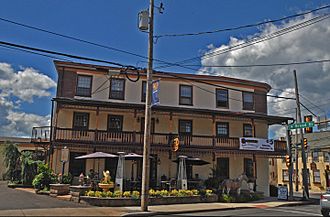Fries's Rebellion facts for kids

Historical marker is in front of this modern motel in Quakertown, Pennsylvania, a central point of Fries's Rebellion
|
|
| Date | 1799–1800 |
|---|---|
| Location | Pennsylvania, United States |
| Outcome | Rebellion suppressed |
|
Pennsylvania Historical Marker
|
|
| Designated: | 2003 |
Fries's Rebellion was a protest by farmers in Pennsylvania between 1799 and 1800. It is also known as the House Tax Rebellion. These farmers, many of whom were Pennsylvania Dutch, were upset about new taxes.
This event was one of three major tax-related protests in the United States during the 1700s. The others were Shays' Rebellion in Massachusetts and the Whiskey Rebellion in western Pennsylvania. In 2003, a special marker was placed in Quakertown, Pennsylvania, to remember Fries's Rebellion. This is where the protest first began.
Contents
Why the Rebellion Started
In 1798, the United States was having problems with France. This period was called the Quasi-War. To prepare for a possible bigger war, the U.S. Congress decided to raise a large army and navy.
To pay for these military forces, Congress created new taxes in July 1798. These taxes were placed on real estate (land and houses) and enslaved people. This was the first time the federal government taxed people's homes directly.
Around the same time, Congress also passed the Alien and Sedition Acts. These laws made it harder to speak out against the government. They also gave the president, John Adams, more power.
The New House Tax
Pennsylvania's share of the new federal tax was about $237,000. There were very few enslaved people in Pennsylvania. So, the tax mainly applied to houses and land.
The value of a house was decided by counting its windows. This way of assessing taxes felt very nosy to many people. Tax assessors would ride around and count windows. Many farmers felt this was unfair and refused to pay. They argued that the tax was not being collected fairly based on the population.
John Fries Organizes Protests
John Fries was an auctioneer who traveled a lot. He knew many German-American farmers in southeastern Pennsylvania. He understood their concerns very well.
In February 1799, Fries started organizing meetings. People came together to talk about how to respond to the new tax. Many farmers wanted to resist paying it.
In Milford Township, tax assessors had trouble doing their job. People there used threats to stop them. At one meeting, government officials tried to explain the tax. But protesters, some armed and wearing old army uniforms, shouted them down. They turned the meeting into a protest rally.
Fries personally warned the assessors to stop their work. When they didn't listen, he led a small group of armed men. They bothered the assessors until they left Milford.
Protest Spreads
The opposition to the tax grew and spread to other parts of Pennsylvania. In some towns, appointed tax assessors resigned because of public threats. Others wanted to quit but couldn't find anyone to take their place.
The government then issued arrest warrants. U.S. Marshals began arresting people who refused to pay the tax. Most arrests happened without problems. However, in Macungie, a crowd gathered to protect a man from being arrested.
After failing to make that arrest, the marshal arrested a few other people. He took them to Bethlehem, Pennsylvania.
Rebels Free Prisoners
Two different groups of protesters decided to free the arrested tax resisters. They marched to Bethlehem. They succeeded in freeing the prisoners without any violence.
In response, President John Adams called out federal troops and local militia. These soldiers marched into the areas where the protests were happening. They began arresting many of the protesters. John Fries was one of the people captured.
Trials and Pardons
About thirty men were put on trial in federal court. John Fries, Frederick Heaney, and John Getman were accused of a very serious crime called treason. They were sentenced to be executed.
However, President John Adams later pardoned Fries and the others. He felt that the definition of treason was very specific. He also believed that the protesters were "ignorant" farmers who had been misled by others. On May 21, 1800, he issued a general pardon for everyone involved in the rebellion.
Historians generally agree that the government reacted too strongly to what was a small local protest. One important result of the rebellion was that German-American communities in Pennsylvania turned away from the Federalist Party.
See also
 In Spanish: Rebelión de Fries para niños
In Spanish: Rebelión de Fries para niños

